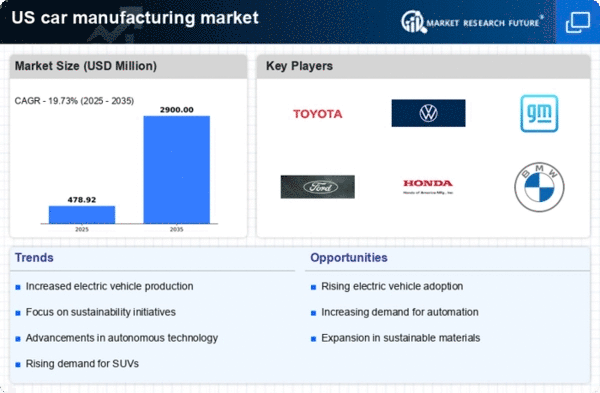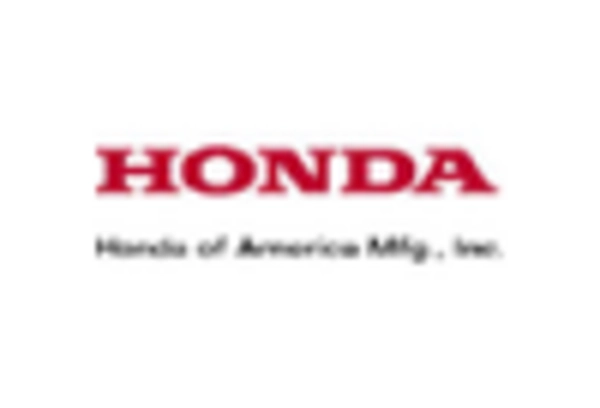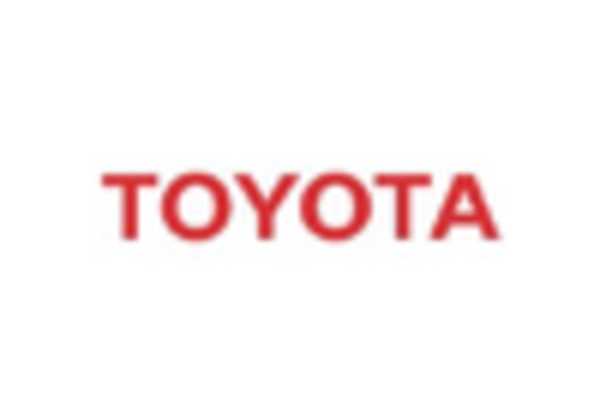Shift Towards Sustainable Practices
The industry is experiencing a notable shift towards sustainable practices, driven by increasing consumer demand for environmentally friendly vehicles. Manufacturers are investing heavily in green technologies, such as electric and hybrid vehicles, to reduce carbon emissions. In 2025, it is estimated that around 30% of new car sales in the US will be electric, reflecting a significant transformation in consumer preferences. This shift not only aligns with regulatory pressures but also enhances brand loyalty among eco-conscious consumers. Furthermore, the adoption of sustainable materials in vehicle production is becoming a standard practice, which could potentially lower production costs in the long run. As a result, the car manufacturing market is likely to see a continuous evolution towards sustainability, influencing production strategies and market dynamics.
Regulatory Compliance and Safety Standards
Regulatory compliance and safety standards are critical drivers in the car manufacturing market, as manufacturers must adhere to stringent federal and state regulations. The National Highway Traffic Safety Administration (NHTSA) enforces safety standards that require manufacturers to implement advanced safety features in vehicles. In 2025, it is anticipated that compliance costs could account for up to 15% of total production expenses. This necessitates ongoing investment in research and development to meet evolving safety requirements. Moreover, manufacturers are increasingly focusing on crash avoidance technologies and driver assistance systems, which not only enhance vehicle safety but also appeal to safety-conscious consumers. Consequently, the emphasis on regulatory compliance is likely to shape product offerings and influence market strategies within the car manufacturing market.
Technological Advancements in Manufacturing
Technological advancements are reshaping the car manufacturing market, with automation and artificial intelligence playing pivotal roles in enhancing production efficiency. The integration of robotics in assembly lines has led to a reduction in labor costs and an increase in output quality. In 2025, it is projected that manufacturers will invest approximately $10 billion in smart manufacturing technologies, which could improve operational efficiency by up to 20%. Additionally, the use of data analytics allows manufacturers to optimize supply chains and predict market trends more accurately. This technological evolution not only streamlines production processes but also enables manufacturers to respond swiftly to changing consumer demands, thereby maintaining competitiveness in the car manufacturing market.
Consumer Preferences for Connectivity Features
Consumer preferences are shifting towards connectivity features in vehicles, significantly impacting the car manufacturing market. Modern consumers expect their vehicles to be equipped with advanced infotainment systems, smartphone integration, and real-time navigation capabilities. In 2025, it is estimated that over 60% of new vehicles sold will include some form of connected technology. This trend is prompting manufacturers to collaborate with tech companies to enhance in-car experiences. As a result, investments in software development and user interface design are becoming increasingly important. The demand for connectivity not only influences vehicle design but also creates new revenue streams through subscription services and app-based functionalities. Thus, the focus on connectivity features is likely to drive innovation and competition within the car manufacturing market.
Economic Factors Influencing Consumer Spending
Economic factors play a crucial role in shaping consumer spending patterns, which directly affect the car manufacturing market. In 2025, the US economy is projected to grow at a rate of approximately 2.5%, influencing disposable income levels and consumer confidence. As economic conditions improve, consumers are more likely to invest in new vehicles, particularly in the mid to high-end segments. Additionally, fluctuations in fuel prices can impact consumer preferences, with lower fuel costs potentially increasing demand for larger vehicles such as SUVs and trucks. Manufacturers must remain agile in their production strategies to align with these economic trends. Therefore, understanding economic indicators is essential for stakeholders in the car manufacturing market to anticipate shifts in consumer behavior and adjust their offerings accordingly.
















